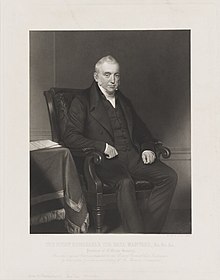Charles Pierrepont, 2nd Earl Manvers
Charles Herbert Pierrepont, 2nd Earl Manvers (11 August 1778 – 27 October 1860) was an English nobleman and naval officer, the second son of Charles Pierrepont, 1st Earl Manvers.[1]
The Earl Manvers | |
|---|---|
 | |
| Member of Parliament for Nottinghamshire | |
| In office 1801–1816 | |
| Personal details | |
| Born | 11 August 1778 |
| Died | 27 October 1860 (aged 82) |
| Political party | Whig |
| Spouse | Mary Laetitia Eyre |
| Relations | Charles Pierrepont, 1st Earl Manvers (father) Evelyn Pierrepont (brother) |
| Military service | |
| Allegiance | Great Britain United Kingdom |
| Branch/service | Royal Navy |
| Years of service | c.1790–1803 |
| Rank | Captain |
| Commands | |

Naval career
editPierrepont entered the Royal Navy as a midshipman, and was made lieutenant on 10 March 1797, and on 11 August the same year commander of Kingfisher, a brig mounting 18 six-pounder guns, with a complement of 120 men. In her he captured the Lynx of 10 guns and 70 men,[2] and also:
- On 15 September 1797 he captured the French privateer lugger Espoir of 2 guns and 39 men.[3]
- On 8 January 1798, while about 150 nautical miles (280 km; 170 mi) west of the Burlings, he captured the Betsey, a French privateer ship of 16 guns and 118 men. She surrendered, having 9 men killed and wounded, while Kingsfisher had only 1 man wounded.[4]
- On 26 May 1798 off Vigo, he captured the Spanish privateer lugger Avantivia Ferrolina, mounting one long gun and four swivels, with a crew of 26.[5]
He was promoted to post-captain into the 74-gun Spartiate on 24 December 1798,[2] and Kingfisher was taken over by his former first lieutenant, Frederick Maitland.[6] Pierrepont returned to England in July 1799. He was subsequently appointed to the 40-gun frigate Dédaigneuse, but resigned his command following the death of his elder brother Evelyn in October 1801.[2] He officially retired from the Navy in 1803.[7]
Political career
editPierrepont took over his brother's seat as Member of Parliament for Nottinghamshire. He became a deputy lieutenant of the county in 1803.[1] In 1806, his father was created Earl Manvers, and Charles was styled Viscount Newark. He remained an MP until 1816, when he succeeded to the Earldom.[7]
Family
editHe married Mary Laetitia Eyre, of Grove Hall, Nottinghamshire (1784–1860), in 1804. They had four children:[8]
- Charles Evelyn Pierrepont, Viscount Newark (1805–1850), MP for East Retford, 1830–1835.
- Sydney William Herbert Pierrepont, 3rd Earl Manvers (1825–1900)
- Lady Mary Frances Pierrepont (d. 1905), married Edward Christopher Egerton in 1845
- Lady Annora Charlotte Pierrepont (d. 1888), married Charles Watkin Williams-Wynn in 1853
See also
editReferences
edit- ^ a b Doyle, James Edmund (1886). The official baronage of England, showing the succession, dignities, and offices of every peer from 1066 to 1885, with sixteen hundred illustrations. London: Longmans, Green. p. 464. Retrieved 26 October 2013.
- ^ a b c Marshall, John (1824). Royal Naval Biography : or Memoirs of the services of all the flag-officers, superannuated rear-admirals, retired-captains, post-captains and commanders, whose names appeared on the Admiralty list of sea officers at the commencement of the year 1760, or who have since been promoted; illustrated by a series of historical and explanatory notes. With copious addenda. Vol. II, Part I. London: Longman, Rees, Orme, Brown, and Green. pp. 184. Retrieved 26 October 2013.
- ^ "No. 14063". The London Gazette. 7 November 1797. p. 1066.
- ^ "No. 14088". The London Gazette. 3 February 1798. pp. 110–111.
- ^ "No. 15043". The London Gazette. 21 July 1798. p. 691.
- ^ "Frederick Lewis Maitland". Oxford Dictionary of National Biography (online ed.). Oxford University Press. 2004. doi:10.1093/ref:odnb/17823. (Subscription or UK public library membership required.)
- ^ a b Symonds, P. A. (2013). "Pierrepont, Hon. Charles Herbert (1778–1860)". History of Parliament Online. Retrieved 26 October 2013.
- ^ "Biography of Charles Herbert Pierrepont, 2nd Earl Manvers (1778–1860)". The University of Nottingham. 2013. Retrieved 26 October 2013.